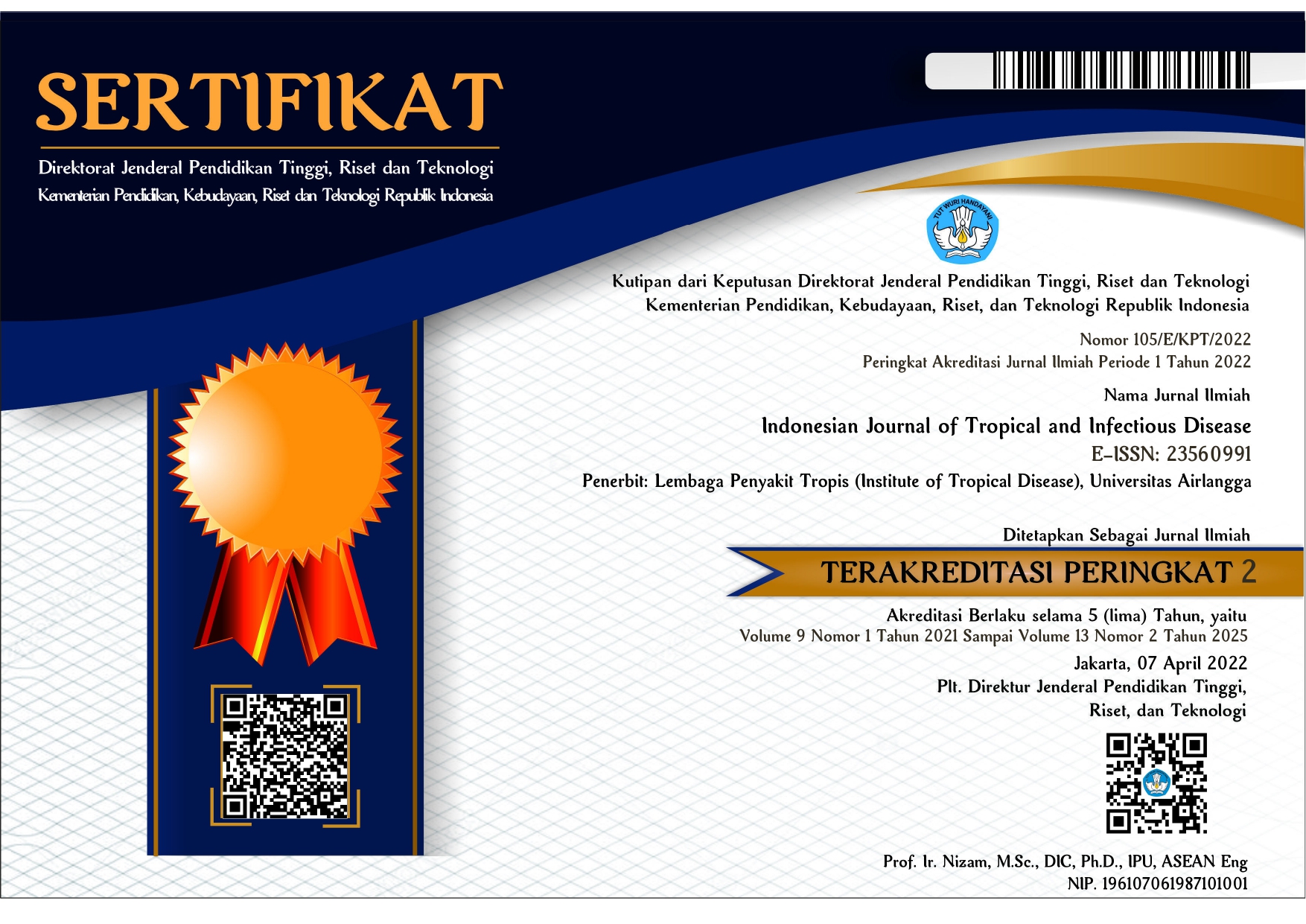The Curative Innovation of Novel Triple-Drug Compared to Double-Drug Regimen in Lymphatic Filariasis: A Systematic Review
Downloads
The World Health Organization has established a global program for the elimination of lymphatic filariasis by 2020; recent data has shown an impracticable result accomplishing it. Therefore, this study aims to identify the efficacy and safety between triple-drugs (DEC, ALB, IVM) and double-drugs (DEC & ALB/IVM & ALB) for lymphatic filariasis treatment. A systematic review was conducted with Preferred Reporting Items for Systematic Reviews and Meta-analysis (PRISMA) statement guidelines. The literature search was done using five databases: PubMed, ProQuest, ScienceDirect, EBSCO, and CENTRAL until December 3, 2020 without any publication date range imposed. Data collection was done by three independent reviewers and entered into a predesigned data extraction form. Cochrane risk of bias tool 2.0 was utilized in the quality assessment of the studies. Search strategies identified 209 studies. Three relevant full-text articles met our inclusion criteria. Overall studies had low risk of bias. The main findings are as follows: (a) Administration of single dose of triple-drug regimen resulted in a total elimination of microfilaria 12 months after treatment whilst 91% participants given with double-drug remained microfilaremic (p=0.002); (b) In larger samples (n=182), triple drug cleared microfilaria in 96% of the participants and only 32% of the participants receiving double-drug regimen after 12 months observation; (c) Statistically, the triple-drug safety has a lower degree than the double-drug regimen (p=0.02). The triple-drug treatment has a better efficacy compared to the double-drug regimen in treating lymphatic filariasis. Furthermore, both regimens are proven safe with no serious adverse events elicited.
CDC. Lymphatic filariasis [Internet]. Centers for Disease Control and Prevention. Centers for Disease Control and Prevention; 2018 [cited 2020 Dec 14]. Available from: https://www.cdc.gov/parasites/lymphaticfilariasis/index.html
Wynd S, Melrose W. D, Durrheim DN, Carron J, Gyapong M. Understanding the community impact of lymphatic filariasis: a review of the sociocultural literature. Bulletin of the World Health Organization. 2007;85:493-498.
World Health Organization. World Health Organization. Lymphatic filariasis [Internet]. [cited 2020 Dec 14]. Available from: https://www.who.int/news-room/fact-sheets/detail/lymphatic-filariasis
Karun V, Hotez PJ, Rosengart TK. Global surgery and the neglected tropical diseases. PLoS Neglected Tropical Diseases. 2017;11(9):e0005563.
InfoDATIN. Situasi Filariasis di Indonesia. Pusat Data dan Informasi Kementerian Kesehatan RI [Internet]. 2019 [cited 2020 Dec 20] Available from:https://www.kemkes.go.id/folder/view/01/structure-publikasi-pusdatin-info-datin.html
Ichimori K, King JD, Engels D, et al. Global programme to eliminate lymphatic filariasis: the processes underlying programme success. PLoS Negl Trop Dis. 2014;8(12):e3328.
World Health Organization. World Health Organization. Global Programme to eliminate lymphatic filariasis: Progress report [Internet]. 2019 [cited 2020 Dec 23]. Available from:https://www.who.int/publications/i/item/who-wer9543
Boniface PK, Elizabeth FI. An Insight into the Discovery of Potent Antifilarial Leads Against Lymphatic Filariasis. Curr Drug Targets. 2020;21(7):657–680.
Rebollo MP, Bockarie MJ. Toward the elimination of lymphatic filariasis by 2020: treatment update and impact assessment for the endgame. Expert Rev Anti Infect Ther. 2013;11(7):723–731.
Lourens GB, Ferrell DK. Lymphatic Filariasis. Nurs Clin North Am. 2019;54(2):181–192.
Macfarlane CL, Budhathoki SS, Johnson S, Richardson M, Garner P. Albendazole alone or in combination with microfilaricidal drugs for lymphatic filariasis. Cochrane Database Syst Rev. 2019;1(1):CD003753.
Thomsen EK, Sanuku N, Baea M, et al. Efficacy, Safety, and Pharmacokinetics of Coadministered Diethylcarbamazine, Albendazole, and Ivermectin for Treatment of Bancroftian Filariasis. Clin Infect Dis. 2016;62(3):334–341.
Page MJ, McKenzie JE, Bossuyt PM, et al. The PRISMA 2020 statement: an updated guideline for reporting systematic reviews. BMJ. 2021;372:n71.
Sterne JAC, Savović J, Page MJ, et al. RoB 2: a revised tool for assessing risk of bias in randomised trials. BMJ. 2019;366:l4898.
King CL, Suamani J, Sanuku N, et al. A Trial of a Triple-Drug Treatment for Lymphatic Filariasis. N Engl J Med. 2018;379(19):1801–1810.
Bjerum CM, Ouattara AF, Aboulaye M, et al. Efficacy and Safety of a Single Dose of Ivermectin, Diethylcarbamazine, and Albendazole for Treatment of Lymphatic Filariasis in Cí´te d'Ivoire: An Open-label Randomized Controlled Trial. Clin Infect Dis. 2020;71(7):e68-e75.
Schulz JD, Neodo A, Coulibaly JT, Keiser J. Pharmacokinetics of Albendazole, Albendazole Sulfoxide, and Albendazole Sulfone Determined from Plasma, Blood, Dried-Blood Spots, and Mitra Samples of Hookworm-Infected Adolescents. Antimicrob Agents Chemother. 2019;63(4):e02489-18.
Abongwa M, Martin RJ, Robertson AP. A BRIEF REVIEW ON THE MODE OF ACTION OF ANTINEMATODAL DRUGS. Acta Vet (Beogr). 2017;67(2):137–152.
Pawluk SA, Roels CA, Wilby KJ, Ensom MH. A review of pharmacokinetic drug-drug interactions with the anthelmintic medications albendazole and mebendazole. Clin Pharmacokinet. 2015;54(4):371–383.
Brunton LL, Hilal-Dandan R, Knollmann BC. Goodman & Gilman's The Pharmacological Basis of Therapeutics. 13th edition. New York: McGraw-Hill; 2018.
Crump A. Ivermectin: enigmatic multifaceted 'wonder' drug continues to surprise and exceed expectations. J Antibiot (Tokyo). 2017;70(5):495–505.
Schulz JD, Coulibaly JT, Schindler C, Wimmersberger D, Keiser J. Pharmacokinetics of ascending doses of ivermectin in Trichuris trichiura-infected children aged 2-12 years. J Antimicrob Chemother. 2019;74(6):1642–1647.
Bennett JE, Dolin R, Blaser MJ. Mandell, Douglas, and Bennett's principles and practice of infectious diseases Volume 1. Philadelphia: Elsevier; 2020.
John LN, Bjerum C, Martinez PM, et al. Pharmacokinetic and safety study of co-administration of albendazole, diethylcarbamazine, Ivermectin and azithromycin for the integrated treatment of Neglected Tropical Diseases [published online ahead of print, 2020 Aug 20]. Clin Infect Dis. 2020;ciaa1202.
Ritter J, Flower RJ, Henderson G, Yoon Kong Loke, Rang HP. Rang and Dale's Pharmacology. 9th ed. Endinburgh: Elsevier; 2020.
Weil GJ, Jacobson JA, King JD. A triple-drug treatment regimen to accelerate elimination of lymphatic filariasis: From conception to delivery. International Health. 2020;13:S60–4.
Walker M, Pion SDS, Fang H, et al. Macrofilaricidal Efficacy of Repeated Doses of Ivermectin for the Treatment of River Blindness. Clin Infect Dis. 2017;65(12):2026–2034.
Stolk WA, Prada JM, Smith ME, et al. Are alternative strategies required to accel- erate the global elimination of lymphatic filariasis? Insights from mathematical models. Clin Infect Dis 2018; 66:260–6.
Dunyo SK, Simonsen PE. Ivermectin and albendazole alone and in combination for the treatment of lymphatic filariasis in Ghana: follow-up after re-treatment with the combination. Trans R Soc Trop Med Hyg. 2002;96(2):189–192.
Thomsen EK, Sanuku N, Baea M, et al. Efficacy, safety, and pharmacokinetics of coadministered diethylcarbamazine, albendazole, and ivermectin for treatment of bancroftian filariasis. Clinical Infectious Diseases. 2016;62(3):334–341.
Laing R, Gillan V, Devaney E. Ivermectin-Old Drug, New Tricks?. Trends Parasitol. 2017;33(6):463–472.
Degani-Katzav N, Klein M, Har-Even M, Gortler R, Tobi R, Paas Y. Trapping of ivermectin by a pentameric ligand-gated ion channel upon open-to-closed isomerization. Sci Rep. 2017;7:42481.
Dubray CL, Sircar AD, Beau de Rochars VM, et al. Safety and efficacy of co- administered diethylcarbamazine, albendazole and ivermectin during mass drug administration for lymphatic filariasis in Haiti: Results from a two-armed, open- label, cluster-randomized, community study. PLoS Negl Trop Dis. 2020;14(6):e0008298.
Edi C, Bjerum CM, Ouattara AF, et al. Pharmacokinetics, safety, and efficacy of a single co-administered dose of diethylcarbamazine, albendazole and ivermectin in adults with and without Wuchereria bancrofti infection in Cí´te d'Ivoire. PLoS Negl Trop Dis. 2019;13(5):e0007325.
Weil GJ, Bogus J, Christian M, et al. The safety of double- and triple-drug community mass drug administration for lymphatic filariasis: A multicenter, open-label, cluster-randomized study. PLoS Med. 2019;16(6):e1002839.
Copyright (c) 2022 Indonesian Journal of Tropical and Infectious Disease

This work is licensed under a Creative Commons Attribution-NonCommercial-ShareAlike 4.0 International License.
The Indonesian Journal of Tropical and Infectious Disease (IJTID) is a scientific peer-reviewed journal freely available to be accessed, downloaded, and used for research. All articles published in the IJTID are licensed under the Creative Commons Attribution-NonCommercial-ShareAlike 4.0 International License, which is under the following terms:
Attribution ” You must give appropriate credit, link to the license, and indicate if changes were made. You may do so reasonably, but not in any way that suggests the licensor endorses you or your use.
NonCommercial ” You may not use the material for commercial purposes.
ShareAlike ” If you remix, transform, or build upon the material, you must distribute your contributions under the same license as the original.
No additional restrictions ” You may not apply legal terms or technological measures that legally restrict others from doing anything the license permits.























